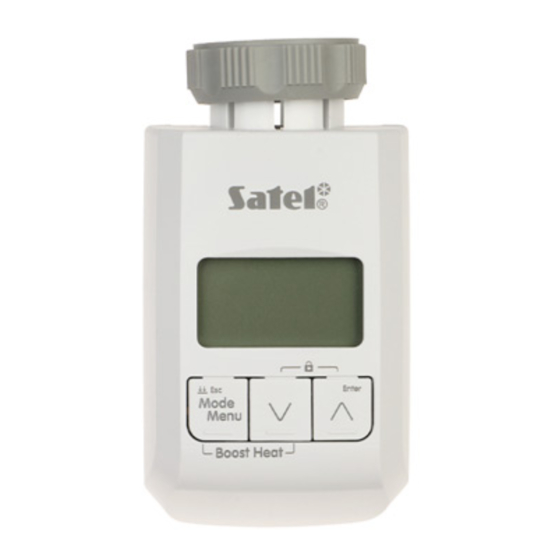
Satel abax2 ART-200 Quick Start Manual
Wireless radiator thermostat
Hide thumbs
Also See for abax2 ART-200:
- Manual (16 pages) ,
- Instructions manual (9 pages) ,
- Manual (11 pages)
Summary of Contents for Satel abax2 ART-200
- Page 1 Wireless radiator thermostat ART-200 Firmware version 1.00 art-200_en 12/22 SATEL sp. z o.o. • ul. Budowlanych 66 • 80-298 Gdańsk • POLAND tel. +48 58 320 94 00 www.satel.pl...
- Page 2 13 August 2005). The device meets the technical regulations of the Eurasian Customs Union. SATEL aims to continually improve the quality of its products, which may result in changes in their technical specifications and software. Current information about the changes being introduced is available on our website.
-
Page 3: Table Of Contents
CONTENTS 1 Features ..........................2 2 Description ........................... 2 LCD display ........................3 Keys ..........................4 Radio communication ....................5 Energy saving mode (ECO) ..................5 Battery status control ..................... 5 Operating modes ......................5 Thermostat calibration ....................5 Thermostat adaptation ....................5 Fast heating function (Boost Heat) ................ -
Page 4: Features
ART-200 SATEL The ART-200 radiator thermostat is used to control the room temperature in a more energy-efficient way. The thermostat allows you to control the radiator valve remotely and manually. It is designed to work within the ABAX 2 two-way wireless system. It is supported ... -
Page 5: Lcd Display
SATEL ART-200 union nut. LCD display. keys to control and configure the thermostat (see: “Configuring the thermostat”). LCD display The symbols and messages shown on the display will help you control and configure the thermostat. When the thermostat is at work, the display shows temperature registered by the sensor (Fig. -
Page 6: Keys
ART-200 SATEL Message Explanation Action to be taken Thermostat adaptation in progress. Anti-freeze protection is enabled (temperature dropped below 5°C). 1. Make sure the thermostat is Trouble with changing the valve mounted correctly on the valve position. and check the valve operation (dismount the thermostat and check the valve pin operation). -
Page 7: Radio Communication
The “Manual setting of the valve position / temperature” can be enabled remotely if the controller is connected to a SATEL alarm control panel. If the operating mode has been enabled remotely, the thermostat can only be controlled manually. Remote control is possible only after the mode is disabled remotely. -
Page 8: Fast Heating Function (Boost Heat)
ART-200 SATEL Boost Heat If the room temperature is too low and uncomfortable, you can enable the Boost Heat function to heat the room faster. The valve will then be fully open for a set time (by default: 15 minutes). The remaining time of the Boost Heat function will be displayed. - Page 9 SATEL ART-200 Be particularly careful during installation and replacement of the battery. The manufacturer is not liable for the consequences of incorrect installation of the battery. The used batteries must not be discarded, but should be disposed of in accordance with the existing rules for environment protection.
-
Page 10: Installation On M30X1.5 Mm Valve
ART-200 SATEL 6. Press . Calibration will begin. Information about the currently selected operating mode of the thermostat will be displayed (by default: “Comfort temperature”). When calibration is in progress, you can configure the thermostat settings (see: “Configuring the thermostat”). - Page 11 SATEL ART-200 2. Place the thermostat on the valve (Fig. 11). Adjust the thermostat position so that the user can easily access the keys and the LCD display. 3. Tighten the thermostat on the adapter using the union nut (Fig. 12). Do it by hand.
-
Page 12: Configuring The Thermostat
ART-200 SATEL 4 Configuring the thermostat 4.1 Remote configuration To find out how to configure the thermostat, please refer to the ABAX 2 controller manual. 4.2 Configuration using the keys Enter the operating mode menu Press any key. Information about the current operating mode of the thermostat will be displayed (see: Table 3). -
Page 13: Exit The Operating Mode Menu
SATEL ART-200 3. Press to start editing. The displayed value (temperature / valve position) will start flashing. to set the temperature / valve position. When editing the “Manual 4. Use setting of the valve position / temperature” mode, if you want to set the temperature, keep pressing the key until the valve position (percentage) switches to temperature (degrees). -
Page 14: Exit The Advanced Settings Menu
ART-200 SATEL Valve closing time after open window detection You can program from 0 to 60 minutes (0 – open window detection disabled). By default: 30. Thermostat adaptation PI ADAPT You can select ON (function enabled) or OFF (function disabled). -
Page 15: Disabling The Keys
SATEL ART-200 Available thermostat status information Temperature registered by the sensor (Pv). Current valve position, where: 0% – valve fully closed, 100% – valve fully open. Current battery voltage (accuracy up to 0.01 V). Current adaptation status: ADAPT PREP – adaptation was never started, ADAPT IP –...




Need help?
Do you have a question about the abax2 ART-200 and is the answer not in the manual?
Questions and answers